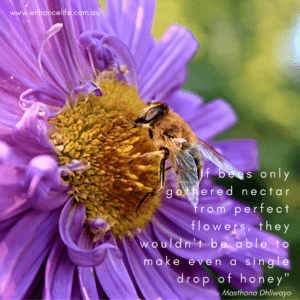Do you struggle with an unhelpful internal monologue? Do you often catch yourself telling yourself that you’re just not good enough, or can’t do ‘that’, or will never do ‘that’?
I wonder if practising kindness and compassion towards others might help you to learn to be kind and compassionate with yourself.
Kindness is an act of giving that can be driven by a number of motivations:
- a desire to bring happiness to another
- a sense of compassion and empathy for the other
- a desire to help the other
- and then there is a sense of duty
Kindness can be a gift of time and effort, it can be a smile or a helping hand, it can be service, or it can be a gift of something wanted or needed.
When kindness comes from a place of compassion the reward for the giver can be greater. Research has found that there is a significant benefit to our physical and mental health when we give to others.
When we give to others we can gain a sense of happiness and worth. When we are the receiver we also benefit from the sense that we are worthy and valuable.
When we are kind to others it has the effect of increasing the other’s awareness and kindness to others. Kindness breeds kindness and compassion breeds compassion. To quote the Dalai Lama “And once you encourage the thought of compassion in your mind, once that thought becomes active, then your attitude toward others changes automatically… It creates a positive and friendly environment.”
It’s easy to forget that kindness and compassion can also be applied to ourselves. The benefit of kindness and self compassion to our own sense of wellbeing cannot be underestimated.
We are sometimes very hard on ourselves. When things don’t go the way we expect them to or the way we’d like them to our internal monologue can start up with a litany of reasons we’re not good enough. These remonstrations can have the effect of lowering our ability to cope as well as lowering our sense of wellbeing. The effect can be that we start to feel flat or like we’re not worthy.

By being kind and compassionate with ourselves is about allowing ourselves to make mistakes and allowing ourselves to be less than perfect. The effect is that our sense of wellbeing and confidence in ourselves can repair or continue to grow. We are more likely to feel at ease with ourselves. We are better able to cope. We are developing resilience, the ability to bounce back.
Instead of telling ourselves we’re no good, or not good enough, we could remind ourselves that mistakes are normal and allow us to learn and improve. Expecting perfection from ourselves is an unkindness. It is human to make mistakes and this is how we learn.
What can you do to be kind and compassionate with yourself?
If you are struggling with being kind to yourself and would like to talk to me at Enhance Life Psychology, head over here to make contact.
Resources:
https://calmclarity.org/2015/09/02/science-shows-that-kindness-is-its-own-reward/
The Art of Happiness: A Handbook for Living by His Holiness the Dalai Lama and Howard C Cutler, M.D.
